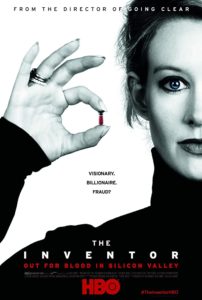The Inventor: Out for Blood in Silicon Valley-A Movie Review
 With a new invention that promised to revolutionize blood testing, Elizabeth Holmes became the world’s youngest self-made billionaire, heralded as the next Steve Jobs. Then, just two years later, her multibillion-dollar company was dissolved.
With a new invention that promised to revolutionize blood testing, Elizabeth Holmes became the world’s youngest self-made billionaire, heralded as the next Steve Jobs. Then, just two years later, her multibillion-dollar company was dissolved.
The story of Elizabeth Holmes and Theranos has inspired quite a bit of content, including a NYT Best Seller, an ABC podcast, a movie starring Jennifer Lawrence, and now an HBO documentary directed by “Going Clear” director, Alex Gibney.
Release date: March 18, 2019 (USA); Run-time: 119 mins; Genres: Documentary.
Director: Alex Gibney
Screenplay: Alex Gibney
Producers: Alex Gibney, Jessie Deeter, Erin Edeiken
Awards: Writers Guild of America Award for Best Documentary Screenplay
Participants (Partial List): Alex Gibney Interviewer (voice); Errol Morris – Filmmaker; Elizabeth Holmes – CEO and Founder of Theranos (archive footage); Dan Ariely – Behavioral Economist; Tyler Shultz – Research Engineer; Ken Auletta – The New Yorker; John Carreyrou – The Wall Street Journal, Author, ‘Bad Blood’
I’d read a significant amount of the long-form articles on Theranos and Elizabeth Holmes, so there wasn’t a lot of new information in here, but the archive footage of Holmes and internal company “rallies” and the collection of clips from interviews with others was helpful in getting a better sense of who she was. Nearly the entire first half of the documentary is spent defining her, and I think that is the key to explaining the story.
Like many of the articles, there were a lot more people involved in the wrong-doing and misdirection than just Holmes and much of that was necessarily left out. In an article from the New Republic, Avi Asher-Schapiro notes, “Missing from the film, however, is any sustained effort to understand how Theranos interacted with the larger economic and social forces that nurtured it. In the hands of Gibney, the rise and fall of Theranos is reduced to a sort of personality puzzle…” That puzzle remains an important aspect of the overall story and is critical to understanding the larger context, and Gibney gets that right.
Gibney tells how Holmes, with no real scientific talent or medical training, was able to convince an ever-widening circle of wealthy and influential elites to fund and support her efforts. Gibney is able to give us a solid glimpse of how Holmes deceived veteran journalists, wooed big-name investors, and eventually, convinced Walgreens to roll out Theranos blood-testing centers in their stores, even though the company hadn’t really invented anything at all.
The comparisons to Steve Jobs are inevitable, as Holmes modeled herself on Steve Jobs’ public persona, even adopting his eccentricities. People who worked at Apple often described Jobs’ ability to seemingly “bend reality” to suit his needs. Holmes tried to do this too, but the film makes it clear she didn’t really have the background and understanding…nor trust…to listen to those around her who knew better. Certainly, inventors doing something never before done and attempting to disrupt an industry are often doing things others say can’t be done, and the inventors have to get past that. But while you can maybe “bend” reality, you can’t “break” it. An example in the film was a problem with the machines overheating. Even I, hardly an engineer, know enough to understand that heat is the greatest enemy of electronics, and cramming too much heat-generating electronics into too small a space will cause them to fail. Laptops initially had to solve this limitation, as did smartphones. Holmes didn’t seem interested in realistic solutions to these sorts of problems. One of the engineers interviewed discusses how there seemed some absolute limit on the size of the device, and she wouldn’t discuss anything that would have made it larger.
The thing I got from the documentary was her use of a personal story (which may or may not be true) to create this aura that she genuinely wanted to disrupt an industry to better the world. In fact, she just wanted to make money. She’d told her father as much. I think she came to believe her own hype and thus charged ahead without listening to the counsel from those around her and believing she could, in fact, bend reality to her will.
If you want to understand the story in-depth read John Carreyrou’s fine Wall Street Journal articles, as well as his book, “Bad Blood.” If you want a great overview of the story that concentrates on Holmes, this is an excellent two-hours you can spend. I’m going to give it a 7, what say you?


